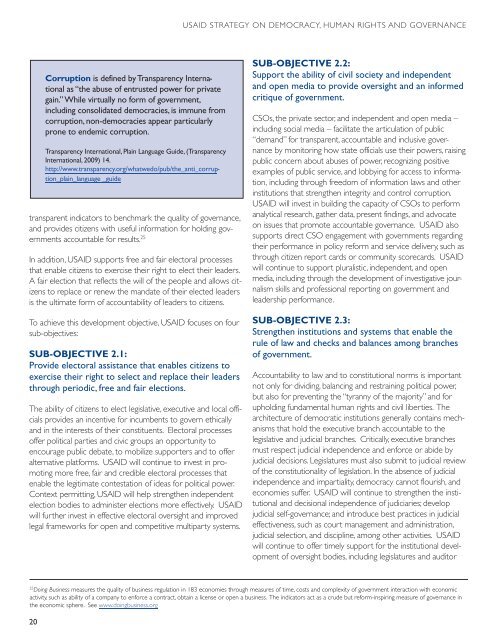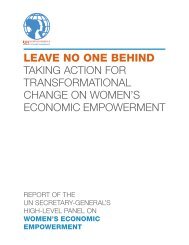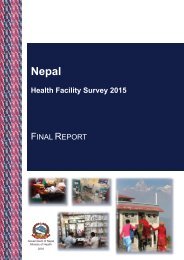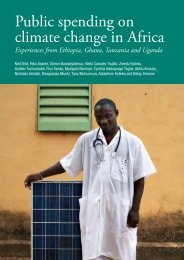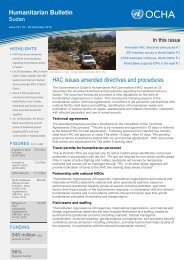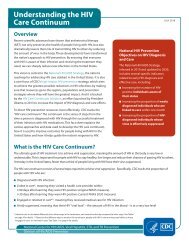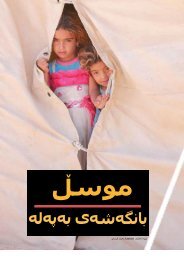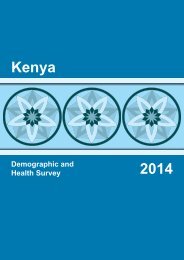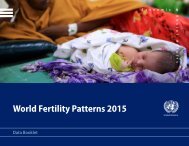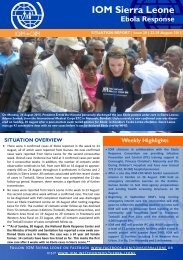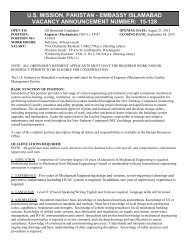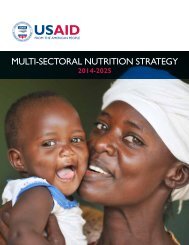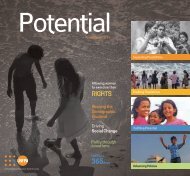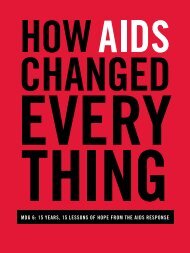<strong>USAID</strong> STRATEGY ON DEMOCRACY, HUMAN RIGHTS AND GOVERNANCECorruption is defined byTransparency Internationalas “the abuse of entrusted power for privategain.”While virtually no form of government,including consolidated democracies, is immune fromcorruption, non-democracies appear particularlyprone to endemic corruption.Transparency International, Plain Language Guide, (TransparencyInternational, 2009) 14.http://www.transparency.org/whatwedo/pub/the_anti_corruption_plain_language_guidetransparent indicators to benchmark the quality of governance,and provides citizens with useful information for holding governmentsaccountable for results. 25In addition, <strong>USAID</strong> supports free and fair electoral processesthat enable citizens to exercise their right to elect their leaders.A fair election that reflects the will of the people and allows citizensto replace or renew the mandate of their elected leadersis the ultimate form of accountability of leaders to citizens.To achieve this development objective, <strong>USAID</strong> focuses on foursub-objectives:SUB-OBJECTIVE 2.1:Provide electoral assistance that enables citizens toexercise their right to select and replace their leadersthrough periodic, free and fair elections.The ability of citizens to elect legislative, executive and local officialsprovides an incentive for incumbents to govern ethicallyand in the interests of their constituents. Electoral processesoffer political parties and civic groups an opportunity toencourage public debate, to mobilize supporters and to offeralternative platforms. <strong>USAID</strong> will continue to invest in promotingmore free, fair and credible electoral processes thatenable the legitimate contestation of ideas for political power.Context permitting, <strong>USAID</strong> will help strengthen independentelection bodies to administer elections more effectively. <strong>USAID</strong>will further invest in effective electoral oversight and improvedlegal frameworks for open and competitive multiparty systems.SUB-OBJECTIVE 2.2:Support the ability of civil society and independentand open media to provide oversight and an informedcritique of government.CSOs, the private sector, and independent and open media –including social media – facilitate the articulation of public“demand” for transparent, accountable and inclusive governanceby monitoring how state officials use their powers, raisingpublic concern about abuses of power, recognizing positiveexamples of public service, and lobbying for access to information,including through freedom of information laws and otherinstitutions that strengthen integrity and control corruption.<strong>USAID</strong> will invest in building the capacity of CSOs to performanalytical research, gather data, present findings, and advocateon issues that promote accountable governance. <strong>USAID</strong> alsosupports direct CSO engagement with governments regardingtheir performance in policy reform and service delivery, such asthrough citizen report cards or community scorecards. <strong>USAID</strong>will continue to support pluralistic, independent, and openmedia, including through the development of investigative journalismskills and professional reporting on government andleadership performance.SUB-OBJECTIVE 2.3:Strengthen institutions and systems that enable therule of law and checks and balances among branchesof government.Accountability to law and to constitutional norms is importantnot only for dividing, balancing and restraining political power,but also for preventing the “tyranny of the majority” and forupholding fundamental human rights and civil liberties. Thearchitecture of democratic institutions generally contains mechanismsthat hold the executive branch accountable to thelegislative and judicial branches. Critically, executive branchesmust respect judicial independence and enforce or abide byjudicial decisions. Legislatures must also submit to judicial reviewof the constitutionality of legislation. In the absence of judicialindependence and impartiality, democracy cannot flourish, andeconomies suffer. <strong>USAID</strong> will continue to strengthen the institutionaland decisional independence of judiciaries; developjudicial self-governance; and introduce best practices in judicialeffectiveness, such as court management and administration,judicial selection, and discipline, among other activities. <strong>USAID</strong>will continue to offer timely support for the institutional developmentof oversight bodies, including legislatures and auditor25Doing Business measures the quality of business regulation in 183 economies through measures of time, costs and complexity of government interaction with economicactivity, such as ability of a company to enforce a contract, obtain a license or open a business. The indicators act as a crude but reform-inspiring measure of governance inthe economic sphere. See www.doingbusiness.org20
<strong>USAID</strong> STRATEGY ON DEMOCRACY, HUMAN RIGHTS AND GOVERNANCEgeneral’s offices, as well as work to develop more transparentand participatory law-making processes. In many situations,accountability and oversight of security sector institutions isneeded to consolidate democratic gains. 26SUB-OBJECTIVE 2.4:Assist state institutions at all levels in delivering onthe mandates of their offices, fulfilling the public trust,and providing public goods and services throughtransparent and responsive governance.In accordance with <strong>USAID</strong> Forward’s focus on local solutions,<strong>USAID</strong> will build the capacity of local and national governmentinstitutions to be responsive to citizen needs and demands, andprovide public goods and services in a transparent and ethicalway. Along with participatory governance processes outlined inSub-Objective 1.2, capacity building activities focus on thequality of democratic forms of governance. Elected, appointedand civil-service personnel at national and sub-national levelsmust perform according to a set of ethical standards and valuesassociated with public service. In addition, they should makeinformed, transparent decisions and possess the skills, knowledgeand experience to perform their stated duties. Formaland informal accountability mechanisms impose constraints onpublic power and encourage officials to act in the publicinterest. Without such measures, scarce public resources maybe squandered and mismanaged, and public benefits may beskewed to unelected elites. <strong>USAID</strong> will implement anti-corruptionefforts that both support the demand for moreaccountable public officials, and the public sector reforms thatare required to make them work, including reforms andstrengthening of institutions of economic governance such ascommercial courts and bankruptcy codes, particularly whensuch institutions do not fairly and consistently apply laws andregulations. <strong>USAID</strong> will continue to support well-planneddecentralization initiatives that have the potential to make localleaders more accountable and responsive to local electorates.DEVELOPMENT OBJECTIVE 3:PROTECT AND PROMOTE UNIVERSALLYRECOGNIZED HUMAN RIGHTSAdvancing human rights is fundamentally linked to development,yet throughout the world billions of people experiencelives of poverty with limited freedom or opportunities toimprove their own capabilities. <strong>USAID</strong> will intensify efforts toprotect human rights and prevent abuses, and promote humanrights principles as they underpin development.While respect for human rights has long been understood as afoundational element of democratic governance, human rightsprotection and promotion is a rapidly evolving field. In 1948,with the adoption of the Universal Declaration of HumanRights, the nations of the world committed to protect a widerange of human rights. Over time, an influential internationalhuman rights movement emerged and mobilized local andinternational actors across borders. More recently, institutionssuch as the International Criminal Court (ICC), the UN HumanRights Council and country-based truth and reconciliationcommissions and human rights ombudsmen offices have giveninstitutional heft to these movements. New internationalnorms such as “do no harm” and “responsibility to protect”have moved from the periphery to the center of internationaldiscourse. The U.S. is working to strengthen national justicesystems and is maintaining support for ad hoc international tribunalsand hybrid courts. Although the United States is notcurrently a party to the ICC, the USG supports the ICC’s prosecutionof those cases that advance American values, consistentwith the requirements of U.S. law.Human rights include the right to be free fromviolations of physical integrity (such as torture,slavery and illegal detention); the collective rights ofall citizens to enjoy political rights and civil liberties;and equality of opportunity and non-discriminatoryaccess to public goods and services.New challenges and opportunities are emerging. Technologyhas created new ways for human rights defenders to mobilizeand communicate, but at the same time has introduced newrisks. Activists are vulnerable to online surveillance, hacking andwebsite attacks, or even physical attacks or detention due totheir online activity. As the Internet becomes increasingly moreimportant for conducting civil society and media work, <strong>USAID</strong>will remain vigilant in including and integrating programmingthat addresses the digital sphere, supporting the continuedrapid expansion of access to the Internet to as yet unconnectedcommunities, while assuring transparency in theInternet’s operations and oversight. Physical threats to human26With the recently released Presidential Policy Directive on Security Sector Assistance, <strong>USAID</strong> will continue to play a pivotal role to ensure security sector developmentstrategies are part of a larger USG strategy. Taking a systems approach, <strong>USAID</strong> will, working closely with its USG partner agencies, assist countries in establishing mechanismsto balance the powers of each branch of government and hold all accountable to the general populace.21
- Page 2: America does not presume to know wh
- Page 8 and 9: USAID STRATEGY ON DEMOCRACY, HUMAN
- Page 10 and 11: USAID STRATEGY ON DEMOCRACY, HUMAN
- Page 12 and 13: USAID STRATEGY ON DEMOCRACY, HUMAN
- Page 14 and 15: USAID STRATEGY ON DEMOCRACY, HUMAN
- Page 16 and 17: USAID STRATEGY ON DEMOCRACY, HUMAN
- Page 18 and 19: USAID STRATEGY ON DEMOCRACY, HUMAN
- Page 20 and 21: USAID STRATEGY ON DEMOCRACY, HUMAN
- Page 22 and 23: USAID STRATEGY ON DEMOCRACY, HUMAN
- Page 26 and 27: USAID STRATEGY ON DEMOCRACY, HUMAN
- Page 28 and 29: USAID STRATEGY ON DEMOCRACY, HUMAN
- Page 30 and 31: USAID STRATEGY ON DEMOCRACY, HUMAN
- Page 32 and 33: USAID STRATEGY ON DEMOCRACY, HUMAN
- Page 34: USAID STRATEGY ON DEMOCRACY, HUMAN
- Page 37 and 38: USAID STRATEGY ON DEMOCRACY, HUMAN
- Page 39 and 40: USAID STRATEGY ON DEMOCRACY, HUMAN
- Page 41 and 42: USAID STRATEGY ON DEMOCRACY, HUMAN
- Page 43 and 44: USAID STRATEGY ON DEMOCRACY, HUMAN
- Page 45 and 46: ANNEX I1I. BUILDING ON THELAST 20 Y
- Page 48: U.S.Agency for International Develo


